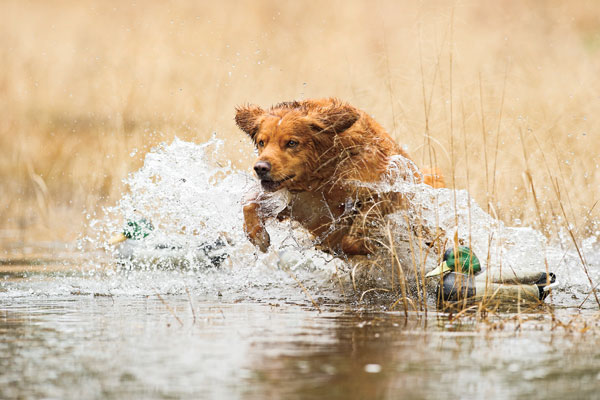 The origin of the Nova Scotia duck tolling retriever is muddled. The general consensus is they are descendants of 17th century "decoy dogs" that were used in Europe to lure ducks into nets. It's also believed these decoy dogs were eventually brought to North America, more specifically Nova Scotia, where they evolved into the breed we are familiar with today.
The origin of the Nova Scotia duck tolling retriever is muddled. The general consensus is they are descendants of 17th century "decoy dogs" that were used in Europe to lure ducks into nets. It's also believed these decoy dogs were eventually brought to North America, more specifically Nova Scotia, where they evolved into the breed we are familiar with today.
During that time period, the dog's role evolved to be that of a near-constant retriever, although just how these dogs worked has been shrouded in misinformation. Many folks believe that the toller, referred to as the "Little River Duck Dog" in its native Nova Scotia, would stand on the shore and wave his tail in the air like a blind-bound hunter flagging geese, which is simply not true. The act of a small, fox-looking pup playfully retrieving along the shore is what drew in the ducks.
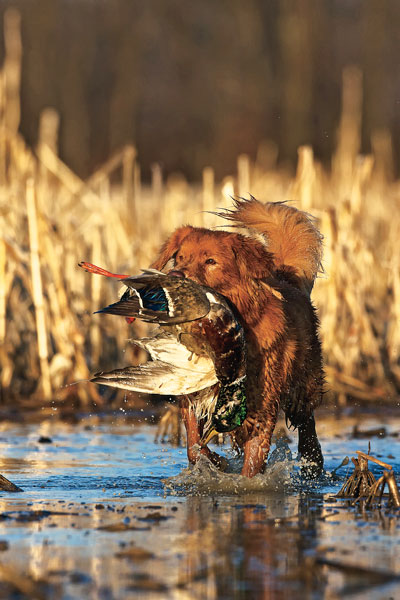 To ensure this, the hunter would stash himself away along the shore of duck-friendly waters and then repeatedly toss a stick so that the toller would retrieve it. The mid-sized dogs resemble a fox nosing along the shore, which would draw in curious fowl. When they swam within shotgun range, the hunter would water-swat as many as possible and then the toller would retrieve them.
To ensure this, the hunter would stash himself away along the shore of duck-friendly waters and then repeatedly toss a stick so that the toller would retrieve it. The mid-sized dogs resemble a fox nosing along the shore, which would draw in curious fowl. When they swam within shotgun range, the hunter would water-swat as many as possible and then the toller would retrieve them.
While that style of hunting would get you kicked out of duck hunting circles today, it did mold a breed with an intense retrieving desire, although that wasn't enough to garner the toller genuine acceptance in the sporting dog world. In fact, the Canadian Kennel Club didn't even recognize the breed until 1945. A presence in the U.S. wouldn't truly exist until the '60s and even then it would take decades for general acceptance.
This acceptance, while nowhere near the level of some of the more popular retrieving breeds, would stem largely from one woman's desire to see the breed gain the recognition she felt it deserved.
Creating A Market
Alison Strang is the woman who literally wrote the book on tollers when she penned The Nova Scotia Duck Tolling Retriever with the help of Gail Macmillan. The book has recently been updated for a re-issue and is easily the most comprehensive work on the breed to date.
I called Alison to get her take on the tollers of today and it became immediately clear that the Vancouver resident is just as passionate about the breed now as she was in 1975 when she took possession of her first toller pup.
"Our youngest daughter was nine at the time and she wanted a dog," Alison recalls. "I wanted to get her a Newfoundland, but they were too big. My husband, who had worked in Nova Scotia, suggested we get her a toller. We did, and we've loved them ever since."
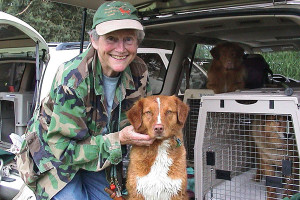 Strang, who had previous show experience with Newfoundlands, would take her love of that original toller and spin it into a career and lifestyle although as she explains, it didn't start out smoothly.
Strang, who had previous show experience with Newfoundlands, would take her love of that original toller and spin it into a career and lifestyle although as she explains, it didn't start out smoothly.
"It took me six months to sell my first litter. We had just arrived in British Columbia and no one knew me; no one knew the breed. I realized that I had to do some PR or I'd be in trouble.
"At the time the editor of a locally published dog magazine asked me if I'd write an article on tollers. She said she couldn't pay me anything but she could give me advertising in trade. That led to some recognition for tollers, which a long-dead Newfoundland breeder called 'bastard golden retrievers.'"
Penning magazine articles was a good start; however, Strang said she met some strong headwinds trying to get further recognition for the breed. "Everybody eventually finds their breed," she notes. "I had found mine in the toller, but it became clear that not everyone was willing to give the dogs a chance. There was a lot of prejudice from the Labrador retriever crowd, in particular. They were highly skeptical of tollers."
This would continue into the early '80s, until the American Kennel Club finally recognized the Nova Scotia duck tolling retriever. This was both a blessing and a curse for Strang and her Westerlea Kennels. "The extra attention was nice, but any time a dog gets popular in North America and particularly the States, breeding problems rise up because of the sudden demand." This has happened multiple times among many of the sporting breeds.
Strang, now retired, had a huge hand in creating toller awareness. Every breeder I talked with only spoke of Alison with respect and reverence.
Personality Traits
Every single person I chatted with familiar with tollers mentioned intellect and drive. Those two traits are desired in all sporting dogs, but they come with caveats. Brynwood Tollers owner Elizabeth Boryczka says, "They are like little sponges when they are puppies. They need lots of small lessons because they will get bored quickly with continued repetition."
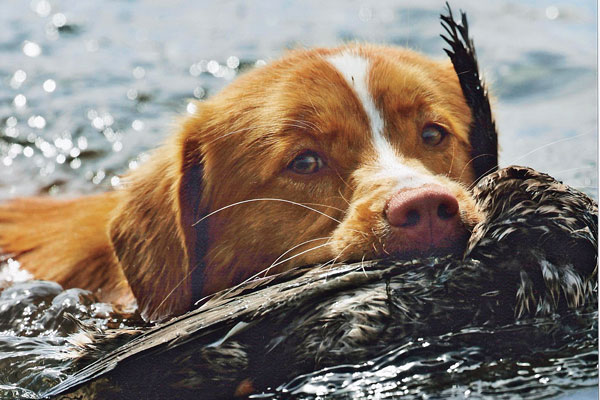 This is an important point and often misunderstood. Just because a dog has a strong retrieving desire and takes quickly to new commands and training drills doesn't mean those tasks should be pushed to the point of boredom. Changing up the routine and keeping a dog interested is crucial to proper training and an absolute necessity with tollers, according to Boryczka. "They can't be trained like a Lab," she says. "They'll become aloof and can even shut down."
This is an important point and often misunderstood. Just because a dog has a strong retrieving desire and takes quickly to new commands and training drills doesn't mean those tasks should be pushed to the point of boredom. Changing up the routine and keeping a dog interested is crucial to proper training and an absolute necessity with tollers, according to Boryczka. "They can't be trained like a Lab," she says. "They'll become aloof and can even shut down."
Boryczka's words echo Strang's sentiments, who also spoke of the breed's high level of energy, which when coupled with the toller's intellect can cause problems for the ill-prepared owner. "There are a lot of tollers who need to be re-homed because they overwhelm first-time owners. Their energy level is off the charts and you've got to understand that before ever taking possession of a puppy."
Ducks and Beyond
At this point, you're probably wondering how modern day tollers function in the duck blind. The answer is, pretty well…provided they've been trained properly. This is no different than any sporting breed, and aside from inherent smarts and retrieving desire, tollers are often very birdy even as pups.
This has led to a small surge in popularity throughout not only duck hunting circles but also upland hunting groups as well. Tollers can hunt and retrieve all forms of waterfowl as well as pheasants, quail and grouse.
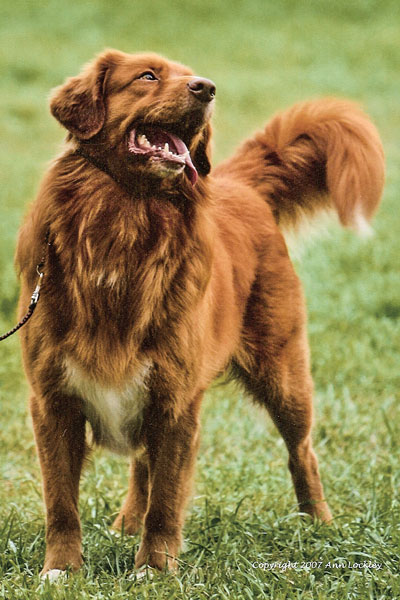 Well-bred tollers will possess a pedigree that is conducive to learning how to hunt just about any kind of gamebird you can find and nearly everyone I spoke with said that the breed's natural instincts are topnotch.
Well-bred tollers will possess a pedigree that is conducive to learning how to hunt just about any kind of gamebird you can find and nearly everyone I spoke with said that the breed's natural instincts are topnotch.
This, of course, shouldn't be stated without a disclaimer. As already mentioned, tollers have seen their share of popularity spikes throughout the years and this has led to some careless breeding in certain instances, which is no different than all popular dog breeds. Because of this, it's even more important to research specific litters.
Tollers have a strong show presence and therefore those bloodlines are readily available; however, if you plan to hunt hard with yours, it'll be necessary to find the right mix of show bloodlines with hunt-test bloodlines. The two, when combined in a puppy, will help ensure that you get a dog that is not only smart but will also take to hunting naturally. This step, which any serious bird hunter should take, is often skipped over for one simple reason—puppies are cute.
More to the point, toller puppies are undeniably adorable. This has led to more impulsive dog purchases than most of us would care to admit and should be a lesson that if you're interested in a toller (or any pup), take the time to peruse bloodlines and pedigree long before ever actually looking at a litter of pups. Decide on a dog from its pedigree, not its rollicking, overwhelming puppy charm. You'll be better off for it, especially when opting for a breed with as specific training needs as a toller.
Further, when you conduct your due diligence, you'll not only reduce the odds of getting a dud, you'll also increase the chances of having an easier-to-train, family friendly dog. There isn't anyone who doesn't want that.
Toller Training
Dog trainer Tom Dokken is quite familiar with tollers, having had several go through his Northfield, Minn., facility. His advice on whipping a toller into shape is patience.
"From a training standpoint, some breeds can take more discipline than others. Tollers don't take to discipline well; instead they require extensive praise and encouragement with as little pressure as possible. If you're heavy-handed in your training techniques, this might not be the right breed for you
Dokken went on to explain that tollers can be exceptional hunters but you need to start them right. "With everything from bird introduction to gunfire introduction, you've got to handle them with kid-gloves," he says. "Baby steps that encourage confidence and won't potentially shut them down are always good.
"Stay patient with your toller and engage him in a series of small steps throughout his training drills and he'll develop into a fine dog. Tollers can be a hard dog to train for inexperienced dog trainers, so it's best to be honest with yourself regarding how much time and patience you have before opting for this breed."






